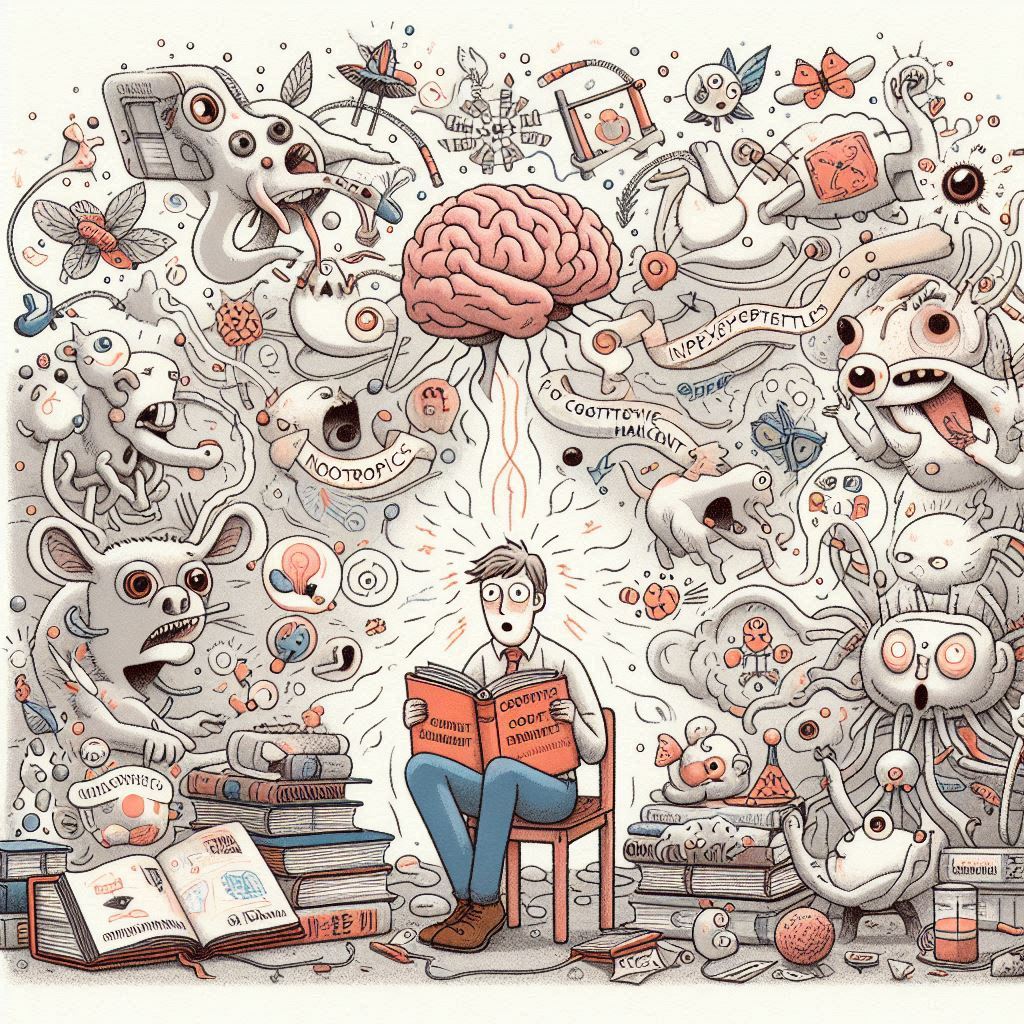The general aim of nootropic research is to find new drugs capable of enhancing directly the efficiency of the cognitive activity of the brain, thus optimising various neuro-psychologic deficits such as, but not exclusively, those related to memory and focus 1
Nootropics, also known as “smart drugs” or “cognitive enhancers”2, are a diverse group of substances that can potentially improve cognitive functions like thinking, learning, and memory, particularly in cases where these functions are impaired. Nootropics can be classified into several subgroups based on their nature and effects. The subgroups include dietary supplements, prescription drugs, synthetic compounds, as well as natural substances like plant extracts with nootropic properties.3
While research on the efficacy and safety of nootropics is still inconclusive, some experts believe they can provide a cognitive “edge” for healthy individuals, others argue there is no strong evidence that supplements or over-the-counter nootropics are truly effective.4 The use of smart drugs have become more recent with reports of Silicon Valley executives micro-dosing to boost creativity5, students using them as cognitive enhancers6, and biohackers experimenting with various substances from technology, drugs or other chemical substances, such as hormones7 in pursuit of mental excellence. The global demand for cognitive enhancers is projected to reach \$4.94 billion by 20258, with the global nootropics market expected to surpass $65 billion by 20339. indicating a growing market, perhaps reflecting a growing belief that we can—and should—chemically upgrade our cognitive hardware?
But as we rush headlong into this brave new world of brain enhancement, it is worth asking:
-
Are we truly becoming smarter, or are we just optimising for a narrow band of cognitive functions at the expense of a broader, deeper consciousness?
-
Could our relentless pursuit of cognitive edge be blinding us to more profound forms of mental and spiritual growth?
-
Will our modern tools for cognitive enhancement sometimes act as obstacles on the path to true understanding?

Biohacking: The Frontier of Self Optimisation
To fully grasp the context of nootropics and smart drugs, it is useful to consider the broader movement of biohacking. Biohacking, at its core, is the practice of making changes to our biology to enhance our physical and cognitive performance. It is a DIY approach to human augmentation, driven by a belief that we can “hack” our bodies and brains to achieve optimal functioning.
Biohacking encompasses a wide range of practices, from relatively mainstream interventions like diet optimisation and exercise routines to more extreme measures like genetic experimentation and cybernetic implants. Nootropics and smart drugs represent just one facet of this multidimensional movement.
Nootropics fit into this paradigm as a chemical means of cognitive enhancement, aligning with the biohacker ethos of using science and technology to surpass natural limitations. Now, what if the use of nootropics goes beyond simply popping a pill for a quick boost? What happens when biohackers approach nootropics with the same rigour they apply to other interventions, carefully stacking different compounds, cycling their use, and meticulously documenting effects? Would this systematic approach to cognitive enhancement then reflect a broader philosophical stance within biohacking: the belief that human beings are fundamentally improvable, and that we have not only the ability but perhaps even the responsibility to take our evolution into our own hands?
In our quest to optimise our biology, are we risking unforeseen consequences? By focusing so intently on measurable metrics of performance, might we be overlooking less quantifiable but equally important aspects of human experience? And how does this attitude of constant self-improvement align with spiritual traditions that emphasize acceptance and being present in the moment?
The Buddhist Perspective
In Buddhist philosophy, reality is understood through the concept of śūnyatā, often translated as “emptiness”. It posits that all phenomena, including our thoughts and perceptions, are empty of inherent, independent existence. This does not mean that nothing exists, but rather that all phenomena, including our thoughts and perceptions, are empty of inherent, independent existence. Everything arises in dependence on causes and conditions, in a web of interdependent relationships. In the context of nootropics and biohacking, the concept of śūnyatā challenges the idea that there are fixed, inherent cognitive traits that can be straightforwardly enhanced. From this perspective, our cognitive abilities are not intrinsic properties but arise from complex interactions of various factors - biological, psychological, and environmental.
The self is seen as an illusion - there is no permanent, unchanging “self” or “soul” that can be optimised. Applied to cognitive enhancement, this perspective suggests too, that there is no “fixed” mind to be optimised, no essential self to be upgraded. Our conscious experience therefore is a dynamic, ever-changing process, not a static entity that can be permanently improved through chemical means. The mind is viewed as a constantly changing flow of sensations, perceptions, and mental states, not a static entity. A practice aligned with this view might involve observing how cognitive states naturally arise and pass away, cultivating equanimity in the face of fluctuating mental performance rather than striving to maintain a particular state.
The nootropics and biohacking communities tend to view the brain through a reductionist, mechanistic lens. The focus is on optimising specific neuro-chemicals, neurotransmitters, and brain structures to enhance cognitive performance, memory, focus, and other mental functions. Nootropics and other interventions are seen as tools to “hack” the brain and chemically engineer improvements in mental capabilities. This approach treats the brain as a machine that can be fine-tuned and optimised through the right combination of supplements, drugs, and technologies.
Buddhism offers a radically different view of the mind and consciousness that goes beyond the mechanistic model. Rather than trying to engineer the mind, Buddhist practices like meditation aim to cultivate mindfulness, presence, and acceptance of the ever-changing nature of consciousness. While a nootropic might temporarily enhance focus, the Buddhist perspective would emphasise that the enhanced state, like all states, is temporary. Attempting to cling to it will only lead to frustration. A Buddhist-inspired approach might involve cultivating adaptability and resilience in the face of changing cognitive states, rather than trying to maintain a constant peak state. This could involve practices that enhance cognitive flexibility and adaptability to different mental states.
Moreover, Buddhism emphasises the importance of “Right View” and “Right Intention”. Right View involves understanding the nature of reality, including the concepts of impermanence, non-self, and the causes of suffering. Right Intention involves the resolve to act ethically and compassionately. The use of smart drugs to forcefully alter our cognitive states may be seen as a form of attachment or craving, potentially creating obstacles to genuine insight and wisdom.
The Buddhist concept of mindfulness (sati) involves clear awareness and attention to the present moment. Paradoxically, the hyper-focus induced by some nootropics might actually hinder this type of open, receptive awareness, narrowing our consciousness rather than expanding it.
Fundamentally, Buddhist philosophy emphasises understanding the nature of mind and consciousness, cultivating wisdom and compassion, and developing a more flexible, adaptive relationship with our cognitive states. This perspective suggests that true cognitive enhancement might involve not just boosting specific mental functions, but cultivating a deeper understanding of the nature of mind itself.
The Brain is NOT a Simple Machine
While Buddhist philosophy offers cautionary insights, modern neuroscience provides a complex picture of how cognitive enhancers affect our brains. Some key findings are listed below:
-
Neurotransmitter Manipulation: Many nootropics work by altering levels of neurotransmitters like dopamine, serotonin, and acetylcholine. While this can lead to short-term cognitive boosts, it may also create imbalances over time.10 The brain’s delicate neuro-chemical balance, may not easily improved upon without consequences.
-
Neuroplasticity: Some cognitive enhancers, like racetams, are thought to enhance neuroplasticity. While this can aid learning, unchecked plasticity might lead to maladaptive brain changes, potentially making us more susceptible to stress or anxiety.
-
Cognitive Trade-offs: Research suggests that cognitive enhancement often comes with trade-offs. For instance, drugs that enhance focus might simultaneously reduce creativity or cognitive flexibility. As the saying goes, there’s no free lunch, one would be convinced of the same in neurobiology.
-
Tolerance and Dependence: Regular use of some cognitive enhancers can lead to tolerance, requiring higher doses for the same effect. This can create a cycle of dependence, where normal cognitive function becomes reliant on the enhancer.
-
Individual Variability: Due to genetic and environmental factors, cognitive enhancers can have widely varying effects on different individuals. What works as a smart drug for one person might be ineffective or even detrimental for another.
The evidence supporting the use of nootropics to enhance cognitive abilities in healthy individuals is limited, while the potential health risks and side effects are more established.11 While nootropics may temporarily alleviate symptoms like fatigue, procrastination or boredom, they do not confer lasting improvements in intelligence or cognitive performance. Their effects are transient, dissipating once the substance is metabolised and eliminated from the body.12 Some nootropics carry a risk of dependence and can produce a range of adverse side effects. They may be especially problematic for younger people, as their brains continue maturing into the mid-twenties.13 Therefore, exposing developing brains to cognitive enhancers could potentially disrupt normal neurological development and have long-term consequences.
Here we arrive at a central paradox:
Can we achieve genuine insight, wisdom, or enlightenment through chemical means?

There is a fundamental tension between the grasping, optimising mindset often associated with cognitive enhancement and the letting-go, accepting attitude cultivated in many spiritual traditions. Buddhist teachings emphasise that enlightenment or awakening isn’t a state to be achieved through force of will or clever mental manipulation, but rather a natural unfolding that occurs when we cease our habitual patterns of clinging and aversion.
Principles of Mindful Biohacking
As we look to the future, it is clear that the landscape of cognitive enhancement and consciousness exploration will continue to evolve. Emerging technologies like brain-computer interfaces, advanced neurofeedback systems, and precisely targeted neuromodulation techniques promise even more powerful tools for altering and potentially expanding consciousness.
At the same time, we are seeing a resurgence of interest in traditional practices for cultivating consciousness, from meditation and yoga to the ritualised use of plant medicines in indigenous traditions. The future may lie not in choosing between technology and tradition, but in finding innovative ways to integrate them.
Here are a few principles for consideration:
-
Intention Setting: Before using any cognitive enhancer, take time to clarify our intentions. Am I seeking to address a specific cognitive challenge, or am I chasing a vague ideal of self-improvement? How does this align with my deeper values and goals?
-
Mindful Observation: Pay close attention to the effects of cognitive enhancers, not just on narrowly defined cognitive tasks, but on the overall state of mind, emotions, and interactions with others. Keep track of both short-term and long-term effects.
-
Cycles and Balance: Rather than pursuing constant cognitive enhancement, consider cyclical approaches that include periods of “cognitive fasting” to allow for rest, integration, and a return to baseline.
-
Ethical Consideration: Reflect on the broader implications of the cognitive enhancement practices. Are they fostering genuine growth and benefit for myself and others, or are they perpetuating harmful patterns of striving and dissatisfaction?
By adopting a more mindful, integrated approach, it may be possible to explore the benefits of cognitive enhancement while minimising the pitfalls and remaining aligned with deeper aspirations for wisdom and well-being. The Buddhist principle of the Middle Way encourages us to seek balance and avoid extremes—in this case:
Can we interpret that as neither wholly rejecting the possibilities offered by cognitive enhancement technologies nor uncritically embracing them as panaceas?
Or, would the path forward lies in approaching these technologies with wisdom, ethical consideration, and a holistic understanding of consciousness?

Rather than seeking a shortcut to enlightenment or a quick fix for cognitive challenges, should we view cognitive enhancers as potential tools in a broader toolkit for cultivating wisdom and well-being?
Ultimately, would the focus be shifted from whether smart drugs would lead to smarter consciousness, to how we can engage with the entire spectrum of consciousness-affecting practices and technologies in a way that fosters genuine growth, insight, and benefit for all?
As we continue to push the boundaries of human potential, how can we do so with mindfulness, compassion, and a deep appreciation for the profound mystery of consciousness itself?
In the end, would the smartest approach to cognitive enhancement be one that recognises the limitations of smartness itself, and remains open to the vast, uncharted territories of consciousness that lie beyond the reach of any pill or technology?
The journey of awakening, it turns out, may be far richer and more complex than any simple cognitive upgrade—and all the more worthwhile for it.
Finally
In the near-future world suppose we have a revolutionary cognitive enhancement technology… the “NeuroOpt”. The NeuroOpt comes in the form of a small implant that can be easily inserted into the brain. Once activated, it enhances all aspects of cognitive function - memory, focus, creativity, and even emotional regulation.
The NeuroOpt works by constantly analysing brain activity and making real-time adjustments to neural patterns, effectively “debugging” and “upgrading” our cognitive processes. It is the ultimate expression of the biohacker’s dream - a tool that can truly optimise the brain.
There are, but 3 caveats:
Once activated, the NeuroOpt cannot be removed or deactivated without causing some brain changes, the extent to which is uncertain at this point.
While it enhances cognitive function, early studies suggest it may dampen the intensity of subjective experiences - things like the appreciation of beauty, the depth of emotions, or the sense of spiritual connection.
The long-term effects on personality and the sense of self are unknown. Some users report feeling like “a different person” after prolonged use.
You have to decide: Do you accept the NeuroOpt?
-
Giurgea, C.E. (1982), The nootropic concept and its prospective implications. Drug Dev. Res., 2: 441-446. https://doi.org/10.1002/ddr.430020505 ↩
-
Cognitive enhancers refer to any substance that enhances cognitive performance, which includes nootropics as well as other substances like stimulants and certain nutrients. Nootropics are a specific category or subset of cognitive enhancers. All nootropics are considered cognitive enhancers, but not all cognitive enhancers are classified as nootropics. ↩
-
Malík, M and Tlustoš P. (2022), Nootropics as Cognitive Enhancers: Types, Dosage and Side Effects of Smart Drugs. Nutrients. 14(16):3367. doi: 10.3390/nu14163367. PMID: 36014874; PMCID: PMC9415189. ↩
-
Brody, B. (2024), What Are Nootropics? WebMD. https://www.webmd.com/vitamins-and-supplements/features/nootropics-smart-drugs-overview ↩
-
Grind, K and Bindley, K. (2023), Magic Mushrooms. LSD. Ketamine. The Drugs That Power Silicon Valley. The Wall Street Journal. https://www.wsj.com/articles/silicon-valley-microdosing-ketamine-lsd-magic-mushrooms-d381e214 ↩
-
Ellis, K. (2018), What are the Implications of the Use of Modafinil as a Study Drug? Pharmaceut Reg Affairs, 7:203. doi: 10.4172/2167-7689.1000 203 ↩
-
Rafiq, Q., Christie, L., & Morgan, H. M. (2023). ‘Biohacking’: A thematic analysis of tweets to better understand how ‘biohackers’ conceptualise their practices. medRxiv, 2023-02. ↩
-
Schifano, F., Catalani, V., Sharif, S., Napoletano, F., Corkery, J.M., Arillotta, D., Fergus, S., Vento, A. and Guirguis, A., (2022). Benefits and harms of ‘smart drugs’(nootropics) in healthy individuals. Drugs, 82(6), pp.633-647. ↩
-
https://www.precedenceresearch.com/nootropics-market ↩
-
Establishing Natural Nootropics: Recent Molecular Enhancement Involved in Neurological Disorders. (2016). Brain Research, 1702, 67–77. doi:10.1016/j.brainres.2016.06.044 ↩
-
Hall W, & Lucke J. (2010). The enhancement use of neuropharmaceuticals: More scepticism and caution needed Addiction. 105(12):2041-3. ↩
-
De Jongh R, Bolt I, Schermer M, & Olivier B. (2008). Botox for the brain: enhancement of cognition, mood and pro-social behavior and blunting of unwanted memories. Neuroscience & Biobehavioral Reviews. 32(4):760-76. ↩
-
https://adf.org.au/drug-facts/cognitive-enhancers/ ↩